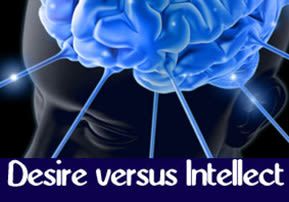
Desire versus Intellect
A person's will or desire to gain some benefit influences his mind - his ability to think straight. Of course, it depends how strong the desire and how resolute the mind…

Excerpts from Rabbi Wasserman’s Classic Essay on Faith, part 2
In view of all this it is therefore extremely puzzling, a great enigma: How could some of the greatest philosophers who ever lived have concluded that the world was brought into existence by chance?
6. The resolution of this enigma can be found in the Torah. The Torah reveals something profound about human psychology when it commands, “Do not take bribes, for bribery blinds the eyes of the wise!” (Deuteronomy 16:19).
What is bribery? In legal terms, the smallest amount necessary to constitute a bribe is a “shaveh prutah”(not much more than a penny), similar to the minimum amount needed [for a court] to find a person guilty of stealing or of taking interest. This negative commandment, to never take a bribe, is directed not only at a judge, but at every man, even the wisest of men, even the most righteous, even Moses himself. Yes, if it could be imagined, even if Moses would take the tiniest bribe, a prutah, his perception of reality would be distorted; he would be incapable of bringing forth a just ruling.
At first sight, this is nothing short of amazing. Can we imagine Moses or Aaron twisting the law and judging falsely merely for the sake of receiving such minuscule benefit? But the Torah itself testifies to the possibility, and “the testimony of G-d is trustworthy” (Psalms 19:8).
We must therefore say that it is a psychological law: A person’s will or desire [to gain some benefit] influences his mind [his ability to think straight]. Of course, it depends how strong the desire and how resolute the mind. A small desire will not exert much influence on a great mind, whereas on a lesser mind it will. A powerful desire [for gain] will exert even more influence. One thing is certain: no matter how minuscule, a desire for gain will always have some affect. Even the tiniest desire can cause the greatest mind to waver a fraction.
This is exemplified in the Talmud (Ketuvot 105b):
Rebbi Yishmael bar Yossi had a land tenant who used to bring him fruits from his [R. Yishmael’s] orchard every Friday before Shabbat. Once, he came on a Thursday. R. Yishmael asked him: “What’s changed this week?” “I have a court case this week”, he answered.”Since I was coming to town anyway, I thought I would bring you your fruits.”R. Yishmael refused to take the fruits [even though they were his]. “I am disqualified from judging your case.”Two [other] rabbis sat and began to hear the land tenant’s case. R. Yishmael sat [on the sidelines] watching. At every turn in the discussion, R. Yishmael felt himself wanting to give advice to his land tenant. “If only he would say this now… if only he would say this…”After the case was decided, he exclaimed, “O that the spirit of those who take bribes would explode! I refused to take what was rightfully mine [and I still couldn’t help being biased and wanting to see him come out winning]. How much more those who actually take what it is not theirs!
It is known that the sages [of the Talmud] were angelic in terms of their expanded consciousness and saintly character. We nevertheless see that the smallest degree of bias could cause them to incline away from the truth. How much more so the rest of us who are sunken in the desires of this world! The desire for gain literally bribes us, saying, “Hey, look, the world is free to do with as you please!”How powerful this bias is! How easily it distorts our perception and blinds us! For when a person has “bought into”a certain bias, he is incapable of recognizing any truth that flies in the face of that bias. As far as that truth is concerned, he might just as well be in a drunken stupor. He doesn’t recognize its existence.
Now, of course, we shouldn’t be astonished that so many great philosophers had difficulty believing that the world was created by a Purposeful Creator. Their minds were surely great, but their desire to gain benefit from the pleasures of this world overcame their ability to think straight. Such a powerful bias can divert a person’s mind to the point that he can say two plus two does not equal four, but five. A person cannot judge whether something is true unless his mind is free from any distorting influence vis a vis the thing he wishes to judge. On the contrary, if recognizing a particular truth in any way contradicts a bias that a person has bought into, no amount of intellect, even the intellect of a great person, can remove or overcome that bias.
7. We learn from this that the foundations of true faith are simple and unquestionable for anyone who isn’t an idiot. It is simply impossible to doubt their veracity. This is only true, however, on the condition that one does not allow oneself to be bribed. One must be disinterested in and free from the desires and allures of this world, and his own personal desires [for gain].
If so, the root of God-denial lies not in the distortion of the intellect in and of itself. It lies in the heart, i.e., in one’s desire to gain benefit [from this world], which distorts and blinds the intellect.
It is clear now why the Torah commands, “Do not stray after your hearts…” (Deuteronomy 15:39), concerning which the sages commented, “Do not follow after the heart’s desire to deny G-d” (Sifri Shlach 15:70). A person is obligated to subdue and sublimate his desires [for personal gain], because this is the only way his intellect will be free of any blinding influence! He will then automatically recognize the truth of the existence of a Creator. This is what Rebbe Akiva meant when he said that the world attests to the Holy One, blessed be He, who created it.
God-denial really has no place in a person’s mind. Its place, if man allows it to exist there, is the heart; in a person’s desire for gain. And if one would be careful not to allow his desires to overcome him, he could never come to deny G-d’s existence or attribute reality to any form of idolatry. It is a sign that one’s desires have grown out of proportion if one is incapable of understanding this simple truth.
And the commandment to believe in G-d? It is a commandment not to allow one’s desires to overcome his intellect so that he will automatically come to believe. In other words, there is no need to struggle to believe. One must simply remove the obstacles that stand in the way of believing. It will then come naturally, of itself…
***
Reprinted with kind permission of www.ou.org.












Tell us what you think!
Thank you for your comment!
It will be published after approval by the Editor.